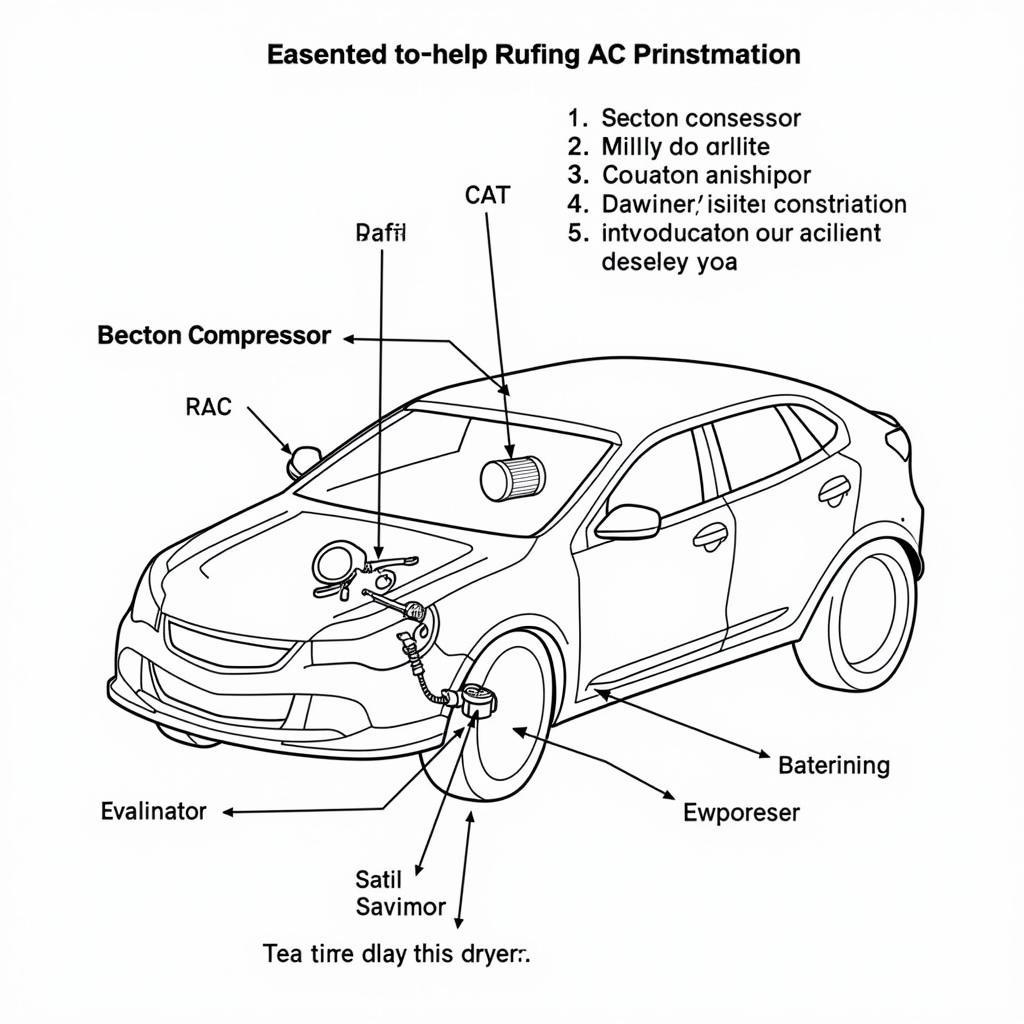Knowing how much it will cost to repair your car’s AC can feel like navigating a minefield. A broken AC system is more than just an inconvenience, it can quickly make driving uncomfortable and even unsafe in hot weather. This guide will help you understand the factors influencing AC repair costs and give you the knowledge to make informed decisions.
Understanding Your Car AC System
Before diving into costs, it’s helpful to understand the basic components of your car’s AC system:
- Compressor: This is the heart of the system, compressing and circulating refrigerant.
- Condenser: Located at the front of your car, the condenser cools the refrigerant, changing it from a gas to a liquid.
- Evaporator: This component evaporates the liquid refrigerant, absorbing heat from the cabin and producing cool air.
- Dryer: This component removes moisture from the system, protecting it from damage.
- Hoses and Lines: These connect the components and allow refrigerant to flow.
 Car AC System Diagram
Car AC System Diagram
Common Car AC Problems
A variety of issues can arise with your car’s AC system, each impacting the repair cost:
- Refrigerant Leak: This is one of the most common problems. Leaks can occur in hoses, seals, or components, leading to reduced cooling efficiency.
- Compressor Failure: The compressor is a complex part and if it fails, replacement can be expensive.
- Electrical Issues: Problems with wiring, sensors, or the AC control module can disrupt the system’s operation.
- Condenser or Evaporator Issues: Damage to these components, often from debris, can lead to leaks or reduced cooling.
Factors Affecting Car AC Repair Costs
The cost to repair your car AC can vary significantly depending on:
- The Specific Problem: A simple refrigerant recharge will cost much less than a compressor replacement.
- Make and Model of Your Car: Luxury or older vehicles often have more expensive parts.
- Labor Costs: Labor rates vary depending on your location and the mechanic’s expertise.
- Choice of Repair Shop: Dealerships generally charge more than independent shops.
Estimating Repair Costs for Common AC Problems
Here’s a general idea of what you might expect to pay for common AC repairs:
- Refrigerant Recharge: $100 – $300
- O-Ring or Seal Replacement: $150 – $400
- Condenser Replacement: $400 – $1000
- Evaporator Replacement: $800 – $1500+
- Compressor Replacement: $600 – $1500+
 Car AC Repair in Progress
Car AC Repair in Progress
“It’s always best to get a proper diagnosis from a qualified mechanic,” says John Smith, Senior Automotive Technician at ABC Auto Repair, “Don’t delay repairs as minor issues can escalate into major problems if left unaddressed.”
Tips to Prevent Car AC Problems
- Regular Inspections: Have your AC system checked annually, ideally before summer.
- Keep it Running: Run your AC for a few minutes every couple of weeks, even during winter, to keep the refrigerant circulating and lubricate the seals.
- Clean the Condenser: Regularly clear debris like leaves and dirt from the condenser located at the front of your car.
When to Consider Repair vs. Replacement
If your car AC is blowing warm air, making strange noises, or emitting foul odors, it’s crucial to seek professional help. A mechanic can diagnose the problem and advise on the most cost-effective solution. In some cases, especially with older vehicles or extensive damage, replacing the entire AC system may be more economical in the long run.
Conclusion
Repairing your car AC doesn’t have to be a financial burden. Understanding the factors affecting costs and taking preventive measures can save you money. By being proactive and choosing a reputable repair shop, you can stay cool and comfortable on the road, even on the hottest days.
FAQs
1. How often should I recharge my car AC?
While there is no set schedule, most manufacturers recommend recharging your car AC every 2-3 years.
2. Can I add refrigerant to my car AC myself?
While DIY refrigerant recharge kits are available, it’s best to leave this task to a professional as handling refrigerant improperly can be dangerous.
3. Why does my car AC smell bad?
A foul odor usually indicates mold or bacteria growth in the evaporator. This requires professional cleaning.
4. Can a dirty cabin air filter affect my AC?
Yes, a clogged cabin air filter can restrict airflow, reducing cooling efficiency.
5. My AC is blowing cold air, but not very strong. What could be the problem?
This could be a sign of a failing blower motor or a blockage in the system.
Need further assistance with your car AC? Reach out to our team on WhatsApp at +1(641)206-8880 or email us at [email protected]. We offer 24/7 support to answer your queries.
For information on car maintenance and repairs, check out these articles:
Let us help you keep your car running smoothly!


